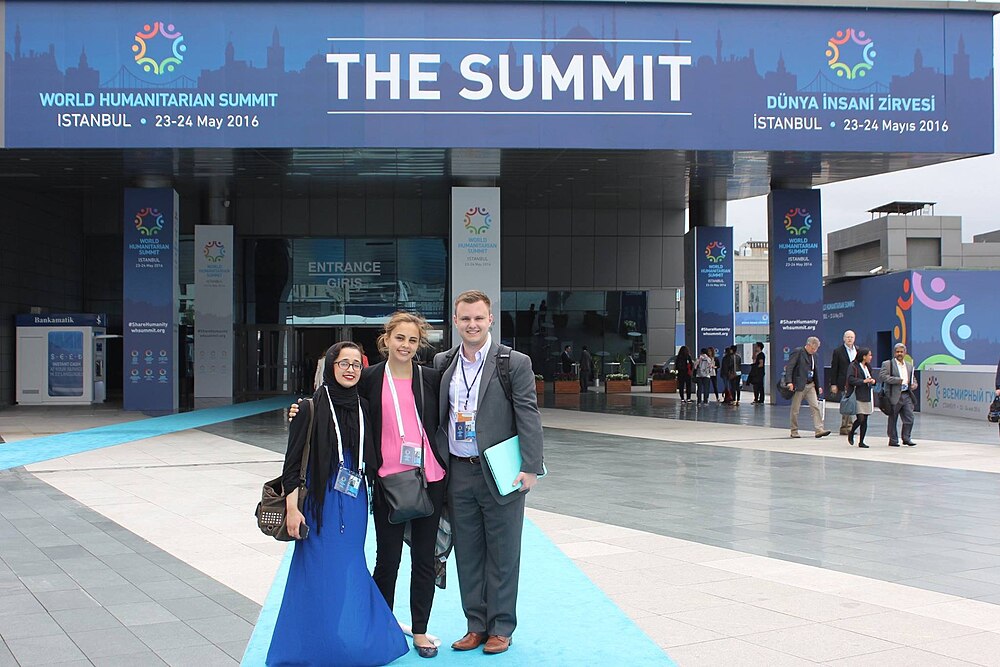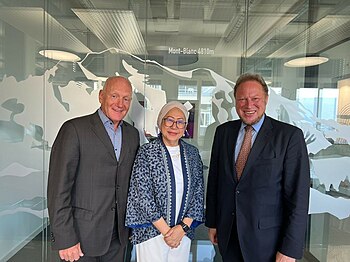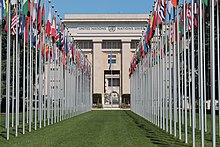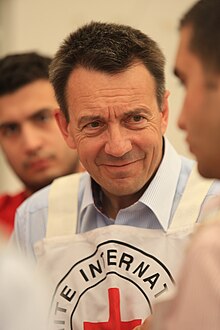CARE is a major international humanitarian agency delivering emergency relief and long-term international development projects. Founded in 1945, CARE is nonsectarian, impartial, and non-governmental. It is one of the largest and oldest humanitarian aid organizations focused on fighting global poverty. In 2019, CARE reported working in 104 countries, supporting 1,349 poverty-fighting projects and humanitarian aid projects, and reaching over 92.3 million people directly and 433.3 million people indirectly.

The Directorate-General for European Civil Protection and Humanitarian Aid Operations, formerly known as the European Community Humanitarian Aid Office, is the European Commission's department for overseas humanitarian aid and for civil protection. It aims to save and preserve life, prevent and alleviate human suffering and safeguard the integrity and dignity of populations affected by natural disasters and man-made crises. Since September 2019, Janez Lenarčič is serving as Commissioner for Crisis Management in the Von der Leyen Commission, and since 1 March 2023, Maciej Popowski leads the organisation as the Director-General.
Official development assistance (ODA) is a category used by the Development Assistance Committee (DAC) of the Organisation for Economic Co-operation and Development (OECD) to measure foreign aid. The DAC first adopted the concept in 1969. It is widely used as an indicator of international aid flow. It refers to material resources given by the governments of richer countries to promote the economic development of poorer countries and the welfare of their people. The donor government agency may disburse such resources to the government of the recipient country or through other organizations. Most ODA is in the form of grants, but some is measured as the concessional value in soft (low-interest) loans.

Islamic Relief Worldwide is a faith-inspired humanitarian and development agency which is working to support and empower the world's most vulnerable people.

Development aid is a type of foreign/international/overseas aid given by governments and other agencies to support the economic, environmental, social, and political development of developing countries. Closely related concepts include: developmental aid, development assistance, official development assistance, development policy, development cooperation and technical assistance. It is distinguished from humanitarian aid by aiming at a sustained improvement in the conditions in a developing country, rather than short-term relief. Development aid is thus widely seen as a major way to meet Sustainable Development Goal 1 for the developing nations.

The New Humanitarian is an independent, non-profit news agency focusing on humanitarian stories in regions that are often forgotten, under-reported, misunderstood or ignored.

Plan International is a development and humanitarian organisation which works in over 75 countries across Africa, the Americas, and Asia to advance children’s rights and equality for girls. Its focus is on child protection, education, child participation, economic security, emergencies, health, sexual and reproductive health and rights, and water and sanitation. As of 2021, Plan International reached 26.2 million girls and 24.1 million boys through its programming.
International aid has been provided to Palestinians since at least the 1948 Arab–Israeli War. The Palestinians view the aid as keeping the Israeli–Palestinian peace process going, while the Israelis claim that it is used to fund terrorism and removes the imperative to Palestinians to negotiate a settlement of the Israel-Palestinian conflict. The Palestinian National Authority (PA), within the West Bank and Gaza Strip, receives one of the highest levels of aid in the world. Aid has been provided to the Palestinian Authority, Palestinian non-governmental organizations (PNGOs) as well as Palestinian political factions by various foreign governments, international organisations, international non-governmental organizations (INGOs), and charities, besides other sources.

The Qatar Red Crescent Society, the Qatari branch of the Red Crescent Society, was established in 1978. In 1981, it gained international recognition from the International Committee of the Red Cross in Geneva and joined the International Federation of Red Cross and Red Crescent Societies (IFRC). It is also a member of the Secretariat of Arab Red Crescent Societies in Jeddah. It became the first philanthropic organization in Qatar to establish a women's branch in 1982.

Tan Sri Jemilah binti Mahmood is a Malaysian physician. She has served as Pro-Chancellor of the Heriot-Watt University Malaysia (HWUM) since September 2021, Professor and Executive Director of Sunway Centre for Planetary Health since August 2021, and Senior Fellow at the Adrienne-Arsht-Rockefeller Foundation Resilience Center. She has been a Board Member of Roche since 2022. She served as Special Advisor to the former Prime Minister of Malaysia Muhyiddin Yassin on Public Health from March 2020 to August 2021 and Under-Secretary General for Partnerships in the International Federation of Red Cross and Red Crescent Societies (IFRC) from January 2016 to 2020. Before joining the IFRC, she served as Chief of the Secretariat of the World Humanitarian Summit at the United Nations in New York, heading the humanitarian branch at the United National Population Fund, Chief of the Humanitarian Response Branch at UNFPA in 2011, President of the Malaysian Medical Relief Society from its foundation in June 1999 to a decade later in 2009. Mercy Malaysia is a medical charity she founded in June 1999, inspired by the Médecins Sans Frontières. In 2008, she was one of the 16 members appointed by Ban Ki-moon, the former Secretary-General of the United Nations to Advisory Group of the Central Emergency Response Fund.
The International Aid Transparency Initiative (IATI) is a global campaign to create transparency in the records of how aid money is spent. The initiative hopes to thereby ensure that aid money reaches its intended recipients. The ultimate goal is to improve standards of living worldwide and globally reduce poverty. The IATI also publishes a standard to be used by organizations, allowing different datasets to be combined and shared.
Devex is a social enterprise and media platform for the global development community. It aims to connect with and inform development, health, humanitarian, and sustainability professionals through news, business intelligence, funding and career opportunities related to international development. As an independent news organization, Devex employs more than 100 staff members in different locations, including Washington, D.C. where its headquarters are located, as well as offices in Barcelona and Manila.
Qatar Charity is a humanitarian and development non-governmental organization in the Middle East. It was founded in 1992 in response to the thousands of children who were made orphans by the Afghanistan war and while orphans still remain a priority cause in the organization's work with more than 150,000 sponsored orphans, it has now expanded its fields of action to include six humanitarian fields and seven development fields.

The United Nations World Humanitarian Summit (WHS) was held in Istanbul, Turkey, on May 23 and 24, 2016. The summit was an initiative of the Secretary-General of the United Nations Ban Ki-moon and was organized by the United Nations Office for the Coordination of Humanitarian Affairs.
Four high level forums on aid effectiveness were held between 2003 and 2011 as part of a "continuous effort towards modernising, deepening and broadening development co-operation and the delivery of aid" coordinated through the OECD. They took place at Rome (2003), Paris (2005), Accra (2008) and Busan (2011).

Cash and Voucher Assistance (CVA) is an umbrella term for humanitarian aid programs that provide cash, or vouchers exchangeable for goods and services, directly to recipients. CVA represents an increasingly significant modality or tool in providing aid, responding to a number of factors including movement from a charity-based to a rights-based approach to aid; the increased need for cost efficiency responding to downwards trends in aid funding; and a realisation of the cost effectiveness of CVA in comparison with prior approaches.

The CALP Network is an organisation originating in 2005 and officially launched in 2009 as The Cash Learning Partnership, with the objectives of increasing the scale and quality of Cash and Voucher Assistance (CVA) employed by humanitarian agencies around the world to deliver aid. CVA encompasses aid delivered as cash, or vouchers exchangeable for goods and services, directly to recipients, and represents an increasingly significant aid modality amounting to 17.9% of total international humanitarian assistance expenditure in 2019. CALP works to build CVA capacity within aid organisations, especially by providing training and e-learning; coordinates the use of CVA by agencies; compiles and shares knowledge and research; and contributes to the development of policy environments encompassing CVA.

Localisation is the practice, in humanitarian aid, to give more decision making power and funding to organizations and people that are based in countries affected by humanitarian emergencies.

The Network for Empowered Aid Response, often called the NEAR Network, is a group of humanitarian civil society organisations based in Africa, Asia, and the Middle East.

The State of the World's Cash 2020 is a publication by CALP Network that reports on the use of cash and voucher assistance in humanitarian aid.



















